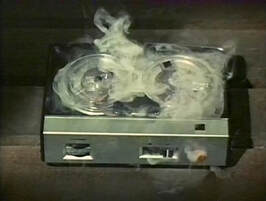 When I was growing up, we watched Mission Impossible. No, not the one with Tom Cruise, but the one with Barbara Cain, Greg Morris, and Peter Graves (to name a few). Of course, these were reruns–the show first aired in 1966–but it was a show my entire family could watch together and was something we all enjoyed. My favorite part of each episode was in the beginning when the team would listen to the recorded message of their mission and we all would hear those famous lines: “Your mission, should you choose to accept it, is to…” and then it would end with “This tape will self-destruct in 5 seconds.” Self-destruction isn’t something we like to think about. We live in a culture that is all about self-help, self-care, and self-improvement–ways we think, perhaps, that self-destruction will be staved off. Like if we just read the right book or put the right thing on our vision boards or lose that stubborn 15 pounds and practice deep breathing and being kind we will somehow be able to hold back the tidal wave that always seems to be waiting in the wings to bury us–ready to destroy us if we stop helping, caring, and improving ourselves. And yet our faith tells us that these self-preserving exercises miss the point entirely. In the Bible, we often read about a call to repentance, and sometimes we understand this call to be about self-improvement, but it’s about SO MUCH MORE. The Greek word often used for repentance in the Bible is μετάνοια or, written using the English alphabet, metanoia (pronounced met-a-NOY-a). It literally means "change of mind," but it’s not like the kind of change of mind one makes when deciding to have an English muffin instead of a bagel. It is the kind of change of mind that completely changes a person–heart, mind, and spirit. Which is likely why, when trying to remember this word and what it means while in seminary, many of us used the phrase, “Metanoia will destroy ya” as a mnemonic. I always think the mnemonic better captures the essence of what the word means than the literal definition. No matter how you slice it, dice it, or define it though, make no mistake, metanoia–repentance–will destroy you, or at least the current, self-focused version of you. And in our self-preservation obsessed culture, we will do our best, and our worst, to avoid this kind of destruction. We will double-down on beliefs that we have held for a long time, no matter how limiting or absolutist they may be. We will conserve, at great cost to ourselves and our relationships, our deepest held convictions. We will twist and turn and pretzel ourselves until we can find a way to suggest that these convictions and ideals mirror the mind of God. We will, in a very real way, “self-destruct,” and we will do this most assuredly whenever we are asked to consider those we might refer to as our “enemies” or our “opponents.” The cool thing about repentance, and the really hard thing about it as well, is that it’s a little more involved than simply choosing the English muffin instead of the bagel. It is God’s work done in us, but only done with our consent. It’s as if God hears us reading scripture passages like John the Baptist calling for a baptism of repentance, or hears us lamenting about the polarized state of the world or our communities or our families, and God says, “Okay, here’s this person who voted for the person you can’t stand in the last election. Here’s the person who owns as many guns as they can while you don’t allow guns in your home. Here’s this person who wants a total ban on abortion when you want women and their doctors to be able to decide what’s best for their healthcare. Here’s this person with whom you disagree about something. Here’s ALL these people with their equal and opposite beliefs, now ENCOUNTER THEM. Have an ACTUAL RELATIONSHIP with them. Then see what you think and believe then.” Because it’s more difficult to hate someone you know. It is more difficult to endorse laws that hurt someone you care about. It is more difficult to make monsters out of another human being when you’ve broken bread, raised a glass, or swapped stories with that human being. It’s more difficult and, potentially, more destructive. But destructive in the very best way. See, when we consent to God’s work in us and then we place ourselves in positions where we have relationships beyond those we have with people who are just like us or people with whom we easily agree, we often find that our beliefs about others who hold different beliefs and come at life from different vantage points than our own really have nothing to do with who they actually are or the reality of their lived experiences. We often find that the stories we’ve been telling about them in our own minds look nothing like the people we meet and actually get to know. Such knowledge completely destroys us–not by breaking us down, but by breaking us open to the possibilities that lie just beyond all that our limiting beliefs would ever let us see or consider. All of this leaves me to wonder if repentance–metanoia–might actually be the thing that helps make us whole. If metanoia will, in fact, destroy our self-preserving, limited belief-holding selves, might it also help destroy the echo chambers we’ve created or the trenches we’ve dug on opposite sides of some imaginary line? What if metanoia–repentance–is not just some churchy word we talk about sometimes during worship, but is the fullest representation of who we are as Church? I’m not sure, but I want to find out…join me? This message will NOT self-destruct in 5 seconds (or at all)...perhaps we shouldn’t either. Pr. Melissa Comments are closed.
|
Rev. Melissa Sternhagen
Rev. Melissa Sternhagen was called as the pastor of St. Paul Congregational UCC in June of 2020. Prior to her call to St. Paul, Pr. Melissa worked as a hospice chaplain in the Ames, IA area, following pastorates at rural churches in Central Iowa and Southern Illinois. Pr. Melissa is a second-career pastor with a background in agribusiness and production & supply operations. She received her M.Div. from Eden Theological Seminary in St. Louis, MO, and holds a MA Ed. in Adult Education and Training, and a BA in Organizational Communications. Archives
July 2024
Categories |

 RSS Feed
RSS Feed
